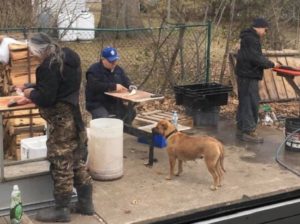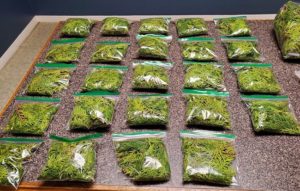Southwestern Anishinabek First Nations respond to COVID-19 pandemic with compassion, cooperation and tradition

By Colin Graf
SARNIA— First Nations across southwestern Ontario are responding to the novel coronavirus disease 2019 (COVID-19) pandemic crisis with compassion, cooperation, and tradition.
Declarations of emergency across the region are being combined with efforts to protect and feed elders, the medically fragile, and others who may have food security problems due to losing work, or local shortages, all while observing social distancing.
In Chippewas of Kettle & Stony Point (KSP), along the southern Lake Huron shore, a volunteer service is combining with a nation-organized food distribution center to get food into the hands of those who need it. Community member Sylvia Mandoka is organizing deliveries to help supplement efforts of the band administration. When her group held their first meeting last week, a fisher offered up his catch for the community.
“Some of the fishermen have come and said this is fresh fish and we want it out there now,” she says. KSP Chief Jason Henry has also donated a catch.
Mandoka and Patricia Shawnoo soon found themselves mobilizing a crew of volunteers to deliver the fish. They met with KSP emergency control group to learn how to screen their volunteers and keep them safe. They are now also helping Elders who cannot get through by phone to register with the distribution centre, or are missing some items not in the hampers given out by the distribution centre.

They are also distributing natural medicines such as cedar to community members.
So far, her volunteers have visited about 40 or 45 homes out of a list of 105.
“The helpers leave items at the door and ask the recipients to sanitize each item when taking it into their residences,” Mandoka says.
The KSP distribution site is allowing food pickups at Hillside School on Mon., Wed., and Fri. and staff are asking people who need help to register by calling the school. Deliveries to seniors are happening on Tues. and Thurs., according to a Facebook post on the administration’s page.
Chief Henry, a fisher himself, has offered his catch for the community and is providing daily video updates to the community on topics such as how to access help and how to sanitize oneself when returning home after working in an essential job.
In Chippewas of the Thames First Nation (COTTFN), Chief Jacqueline French told CBC Radio that her staff handed out around 375 food baskets that had been prepared to try and reach every household in the community on Monday; 450 were made and distribution was continued Tues, she said. Another round of food distribution is planned, French said.
The administration decided to take a proactive response to try and prevent the need for members leaving the First Nation.
“We reached out to our food distributors, and staff did an amazing job [in preparing the baskets],” Chief French said.
The food was distributed at the Antler River School while observing social distancing protocols. Traditional medicines and kits with children’s’ learning activities were also included. The crisis has brought the community together, though not physically, she said.
“We’ve always taken care of our families,” French added. COTTFN has declared a state of emergency and is keeping only essential services operating.
At Bkejwanong (Walpole Island First Nation), the emergency declaration came on Monday, along with a video message Tues. from Councillor Ron Soney.
“Do our part and stay home unless we need food or medicine,” urged Soney to community members.
Essential services, including a food distribution program, are being maintained and extra capacity is being added to social services on the Island to provide food support, Soney said.
Operations Manager James Jenkins said that the Island’s food bank is easier to access and wait times have been shortened to ensure all community members have access to nutrition. He noted that it has been challenging to broaden access while maintaining the safety of staff, but their efforts have resulted in a “hybrid drive-up system” that allows people to drive up to collect food without entering any buildings. Members are encouraged to call ahead so that their order can be prepared ahead of arrival, Jenkins says. Some deliveries are being made; however, it is not available to all as there is a shortage of staff.
The administration has opened the food bank to more families to help those who may be newly experiencing food insecurity due to layoffs and other factors related to the COVID-19 pandemic.
Soney explained that Bkejwanong’s Home and Community Care program operators are taking steps to prioritize their clients and visit elders who are on their own as soon as possible.
“We’re re-focussing to get to those who absolutely rely on our services and may be immobile or reliant for their day-to-day needs [on the visiting care program],” Jenkins said in a phone interview.
Workers are trying to get the word out if anyone knows Elders on their own who need help to get in touch with the service, Jenkins added.
Located on the St. Clair River along the American border, the First Nation owns a ferry service to the US— a service that was shut down last Friday, except in case of an emergency, Jenkins says. Staff are still on duty because the ferry is one of only two means of entry or exit from the Island, and the Nation stands to lose money as no revenue is coming in with the border closed, he explained. The Island has not experienced problems with Canadian vacationers returning from the US and visiting or shopping instead of self-isolating, he said.
Bkejwanong is arranging rotating shifts to help with distancing for over 100 workers classed as essential who are still on the job, Jenkins said. Chief and Council will be providing daily video updates, Soney said in the Tues. video.
Aamjiwnaang First Nation declared an emergency Mon. night, and called for all non-essential businesses to close in line with the Ontario decision to close businesses, according to a post on the community’s website and Facebook page.
“While declaring a state of emergency may seem like a serious measure, Aamjiwnaang is doing so as a precautionary measure and to assist in our preparedness rather than having to do it when it may be too late,” the release read.


